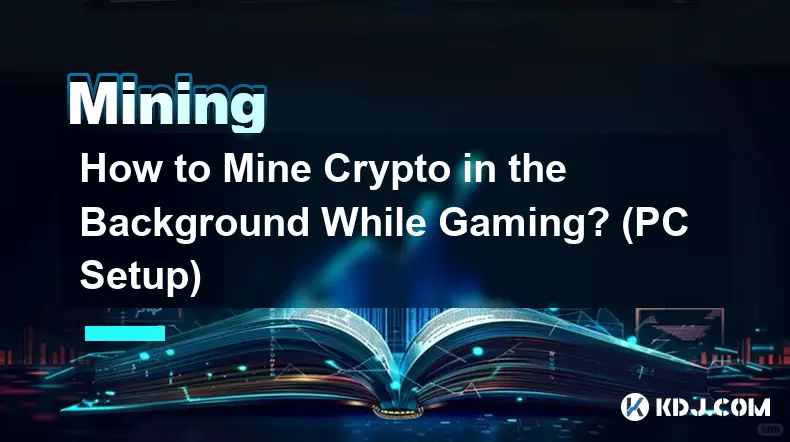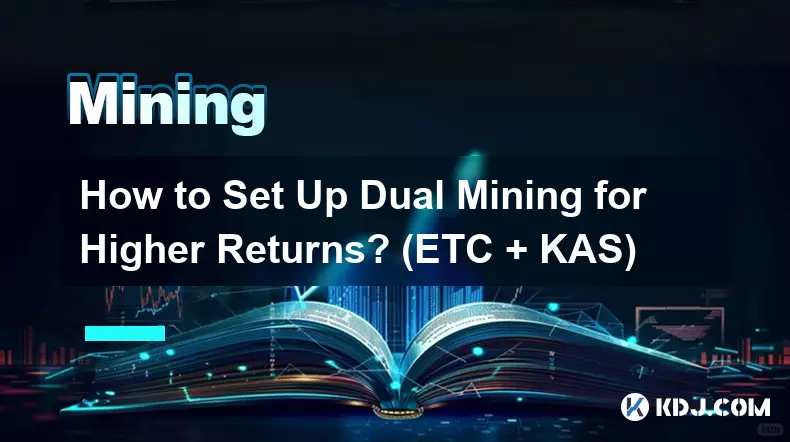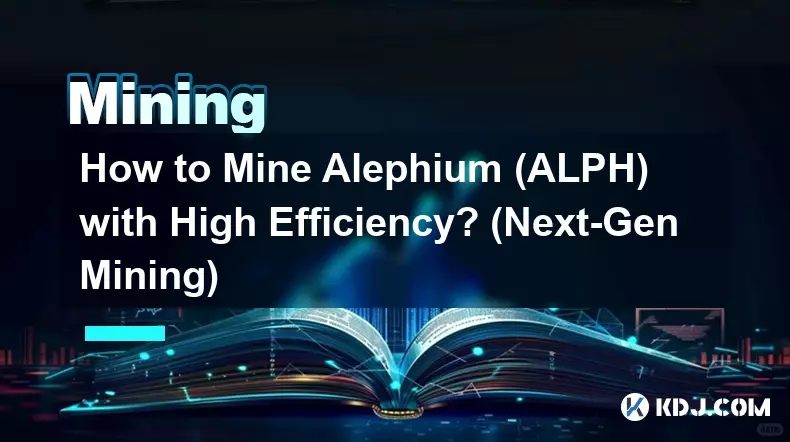-
 bitcoin
bitcoin $87959.907984 USD
1.34% -
 ethereum
ethereum $2920.497338 USD
3.04% -
 tether
tether $0.999775 USD
0.00% -
 xrp
xrp $2.237324 USD
8.12% -
 bnb
bnb $860.243768 USD
0.90% -
 solana
solana $138.089498 USD
5.43% -
 usd-coin
usd-coin $0.999807 USD
0.01% -
 tron
tron $0.272801 USD
-1.53% -
 dogecoin
dogecoin $0.150904 USD
2.96% -
 cardano
cardano $0.421635 USD
1.97% -
 hyperliquid
hyperliquid $32.152445 USD
2.23% -
 bitcoin-cash
bitcoin-cash $533.301069 USD
-1.94% -
 chainlink
chainlink $12.953417 USD
2.68% -
 unus-sed-leo
unus-sed-leo $9.535951 USD
0.73% -
 zcash
zcash $521.483386 USD
-2.87%
What are the most promising mining currencies?
Ethereum is the second-largest cryptocurrency by market capitalization, and its native currency, ETH, is used to pay for transaction fees and to reward miners.
Jan 10, 2025 at 01:30 pm

Key Points:
- 1. Ethereum (ETH): The second-largest cryptocurrency by market capitalization, Ethereum is a decentralized blockchain platform that supports smart contracts. It has a large and active community, and its native currency, ETH, is used to pay for transaction fees and to reward miners.
- 2. Bitcoin (BTC): The original cryptocurrency, Bitcoin is a decentralized digital currency that uses peer-to-peer technology to facilitate payments. It is the most widely recognized and traded cryptocurrency, and it is often considered a store of value.
- 3. Litecoin (LTC): A peer-to-peer cryptocurrency, Litecoin is similar to Bitcoin, but it has a faster block time and a larger maximum supply. It is often used for smaller transactions and for testing new features.
- 4. Dogecoin (DOGE): A lighthearted and community-driven cryptocurrency, Dogecoin was created as a joke, but it has since gained a large following. It is often used for online tips and donations.
- 5. Zcash (ZEC): A privacy-focused cryptocurrency, Zcash uses zero-knowledge proofs to provide users with anonymity. It is popular among users who value privacy, and it is often used for transactions that require special care.
Detailed Guide:
1. Ethereum (ETH):
Advantages:
- Large and active community: Ethereum has one of the largest and most active communities in the cryptocurrency space. This community provides support for developers, miners, and users.
- Smart contracts: Ethereum supports smart contracts, which are programs that can be stored and executed on the blockchain. This allows for the creation of decentralized applications (dApps) that can automate a wide range of tasks.
- Strong developer ecosystem: Ethereum has a strong developer ecosystem, with many developers contributing to the platform's development. This ecosystem helps to ensure that Ethereum remains at the forefront of innovation.
Disadvantages:
- High transaction fees: Ethereum's transaction fees can be high, especially during periods of high demand. This can make it expensive to use Ethereum for small transactions.
- Scalability challenges: Ethereum's scalability challenges limit the number of transactions that can be processed per second. This can lead to longer confirmation times and higher transaction fees during periods of high demand.
2. Bitcoin (BTC):
Advantages:
- First mover advantage: Bitcoin is the first cryptocurrency, and it has a strong brand recognition. This makes it more likely to be accepted by merchants and consumers.
- Store of value: Bitcoin is often considered a store of value, similar to gold. This is because it is decentralized and has a limited supply.
- Security: Bitcoin is one of the most secure cryptocurrencies, and it has never been successfully hacked.
Disadvantages:
- Slow transaction speed: Bitcoin's transaction speed is slow compared to other cryptocurrencies. This can make it unsuitable for small transactions that require quick confirmation times.
- High energy consumption: Bitcoin mining consumes a lot of energy, which has raised concerns about its environmental impact.
- Regulatory uncertainty: Bitcoin is still relatively new, and there is a lot of regulatory uncertainty surrounding it. This could create challenges for businesses that want to accept Bitcoin.
3. Litecoin (LTC):
Advantages:
- Faster transaction speed: Litecoin has a faster transaction speed than Bitcoin, which makes it more suitable for smaller transactions.
- Test ground for Bitcoin: Litecoin is often used as a test ground for new features that are later implemented in Bitcoin. This can help to ensure that Bitcoin remains secure and stable.
- Lower transaction fees: Litecoin's transaction fees are typically lower than Bitcoin's, which makes it more affordable to use for small transactions.
Disadvantages:
- Smaller community: Litecoin has a smaller community than Bitcoin, which means that it may receive less support from developers and users.
- Less liquidity: Litecoin has less liquidity than Bitcoin, which can make it more difficult to buy and sell.
- Lower price: Litecoin's price is lower than Bitcoin's, which can make it less attractive to investors who are looking for a store of value.
4. Dogecoin (DOGE):
Advantages:
- Community-driven: Dogecoin has a strong and passionate community, which helps to drive its growth and popularity.
- Low transaction fees: Dogecoin's transaction fees are very low, which makes it a great option for small transactions and for tipping online.
- Fun and meme-able: Dogecoin is a lighthearted and meme-able cryptocurrency, which has helped to make it popular among online users.
Disadvantages:
- Limited use cases: Dogecoin has limited use cases, and it is not as widely accepted as Bitcoin or Ethereum.
- Limited community experience: Dogecoin's community is not as experienced as the communities of other cryptocurrencies, which can lead to some growing pains.
- No active development team: Dogecoin does not have an active development team, which means that there is less innovation and support for the coin.
5. Zcash (ZEC):
Advantages:
- Privacy: Zcash provides users with anonymity by using zero-knowledge proofs. This makes it a popular choice for users who value privacy.
- Security: Zcash is a very secure cryptocurrency, and it uses a number of advanced cryptographic techniques to protect user data.
- Large community: Zcash has a large and active community, which helps to support the development and adoption of the coin.
- Disadvantages: *
Disclaimer:info@kdj.com
The information provided is not trading advice. kdj.com does not assume any responsibility for any investments made based on the information provided in this article. Cryptocurrencies are highly volatile and it is highly recommended that you invest with caution after thorough research!
If you believe that the content used on this website infringes your copyright, please contact us immediately (info@kdj.com) and we will delete it promptly.
- Wall Street Whales, DeFi Dynamos, and the Cross-Asset Surge: Decoding BTC, ETH, and Hyperliquid's Latest Plays
- 2026-02-01 13:00:02
- The Big Apple's Crypto Crunch: Dogecoin, Rugpulls, and the Elusive Opportunity
- 2026-02-01 12:55:01
- Bitcoin Tumbles: Trump's Fed Pick and Geopolitical Jitters Spark Price Drop
- 2026-02-01 12:45:01
- Bitcoin's Rocky Road: Inflation Surges, Rate Cut Hopes Fade, and the Digital Gold Debate Heats Up
- 2026-02-01 09:40:02
- Ethereum Navigates Bull Trap Fears and Breakout Hopes Amidst Volatile Market
- 2026-02-01 12:55:01
- Bitcoin Shows Cheaper Data Signals, Analysts Eyeing Gold Rotation
- 2026-02-01 07:40:02
Related knowledge

How to Earn Passive Income with DePIN Mining? (New Trend 2026)
Feb 01,2026 at 12:40pm
Understanding DePIN Mining Mechanics1. DePIN mining relies on real-world infrastructure participation rather than computational hashing. Users deploy ...

How to Handle Mining Taxes in 2026? (Reporting Guide)
Feb 01,2026 at 01:39am
Tax Classification of Mining Rewards1. Cryptocurrency mining rewards are treated as ordinary income at the fair market value on the date of receipt. 2...

How to Start Solo Mining and Win a Block Reward? (High Risk/Reward)
Feb 01,2026 at 06:40am
Understanding Solo Mining Mechanics1. Solo mining means operating a full node and attempting to solve cryptographic puzzles independently without join...

How to Mine Crypto in the Background While Gaming? (PC Setup)
Feb 01,2026 at 01:20pm
Optimizing GPU Utilization During Gaming Sessions1. Modern gaming GPUs often idle certain shader units or memory bandwidth during less demanding scene...

How to Set Up Dual Mining for Higher Returns? (ETC + KAS)
Feb 01,2026 at 02:19am
Dual Mining Fundamentals1. Dual mining allows a single GPU to simultaneously contribute computational power to two different blockchains using compati...

How to Mine Alephium (ALPH) with High Efficiency? (Next-Gen Mining)
Feb 01,2026 at 05:39am
Understanding Alephium's Unique Consensus Mechanism1. Alephium employs a sharded Proof-of-Work (PoW) consensus called BlockDAG with Recursive Sharding...

How to Earn Passive Income with DePIN Mining? (New Trend 2026)
Feb 01,2026 at 12:40pm
Understanding DePIN Mining Mechanics1. DePIN mining relies on real-world infrastructure participation rather than computational hashing. Users deploy ...

How to Handle Mining Taxes in 2026? (Reporting Guide)
Feb 01,2026 at 01:39am
Tax Classification of Mining Rewards1. Cryptocurrency mining rewards are treated as ordinary income at the fair market value on the date of receipt. 2...

How to Start Solo Mining and Win a Block Reward? (High Risk/Reward)
Feb 01,2026 at 06:40am
Understanding Solo Mining Mechanics1. Solo mining means operating a full node and attempting to solve cryptographic puzzles independently without join...

How to Mine Crypto in the Background While Gaming? (PC Setup)
Feb 01,2026 at 01:20pm
Optimizing GPU Utilization During Gaming Sessions1. Modern gaming GPUs often idle certain shader units or memory bandwidth during less demanding scene...

How to Set Up Dual Mining for Higher Returns? (ETC + KAS)
Feb 01,2026 at 02:19am
Dual Mining Fundamentals1. Dual mining allows a single GPU to simultaneously contribute computational power to two different blockchains using compati...

How to Mine Alephium (ALPH) with High Efficiency? (Next-Gen Mining)
Feb 01,2026 at 05:39am
Understanding Alephium's Unique Consensus Mechanism1. Alephium employs a sharded Proof-of-Work (PoW) consensus called BlockDAG with Recursive Sharding...
See all articles
























![[Audio stories] Streamer Became a Billionaire Overnight After Buying One Junk Coin [Audio stories] Streamer Became a Billionaire Overnight After Buying One Junk Coin](/uploads/2026/02/01/cryptocurrencies-news/videos/origin_697eaa9a495ed_image_500_375.webp)

















































